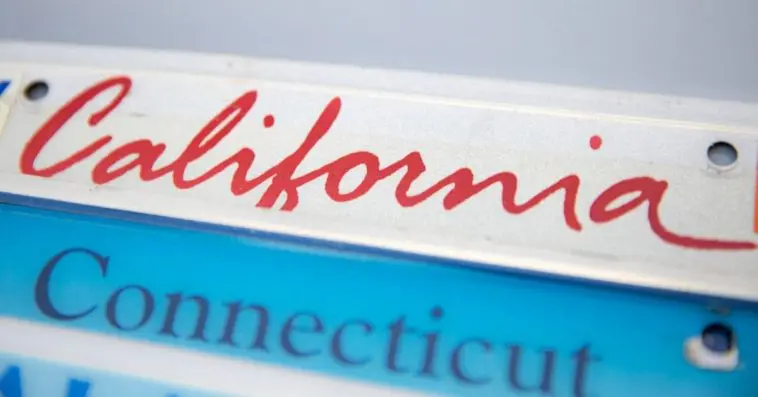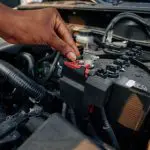Did you know that it takes 2 – 5 weeks to renew your car registration in California according to the DMV?
My registration is about to expire in a month, I do want to be ahead of the system.
The question that remains high on my mind is “How Long Can You Drive With Expired Tags in California?”.
California doesn’t have a grace period for renewing your car registrations/tags and I cannot drive with expired tags.
I am liable to be cited for tickets from the very next day. After a period of 6 months, the officials can impound my car if I do not display my renewed tags.
The hook here is even after receiving citations once, I can keep receiving multiple citations if I continue to drive with expired tags. This can continue until I pay all my tickets and renew my tags.
In California, particularly, the penalties are compounded, leaving me with massive fines, that can prove to be an expensive affair.
TABLE OF CONTENTS
Driving With Expired Tags In California
The State of California doesn’t give the drivers any leeway when it comes to the renewal of car tags.
Driving with expired tags is an infringement of the section Vehicle Code 5204 of the California Law.
However, it is a relatively minor charge that is open to dismissal when I pay the fine and take corrective actions.
What Happens If I Am Pulled Over?
Since expired tags are a direct violation of the law, I could face several punishments, depending on the police officer.
When I am pulled over, the officer can choose one of the following:
- Issue a citation and also instruct me to renew my registration within 30 days.
- Issue a warning but not choose to write a ticket.
- Leave me with a citation but not impound the car if the registration has expired more than 6 months ago.
- Penalize me and also impound my car, again if my car holds an expired registration for 6 months and more.
Remember, the officer can write me a citation for expired tags if I parked (not on private property) my car and left it unattended.
Also, if the driving license or insurance is missing or expired, your penalties may increase.
What Is My Penalty?
Penalty for driving with expired tags carries a base fine of $25 in addition to the penalty assessment.
It is a tax multiplier added by the state and about 4-9 times the base fine, which leads to about $100 or $200. And, it may also include processing fees.
California follows a progressive penalty system which gets expensive, the longer I wait. A car with a tag that expired 6 months ago, would be issued a citation and also impounded.
If you think that it all goes away when correcting the issue (i.e, a new tag), you are entirely mistaken.
In both the above cases, I would have to pay the fine and appear in court with proof of my new tag on the date mentioned in the citation.
In a few counties like Los Angeles, I can complete the process at the clerk’s window without having to see the judge.
But, if I fail to appear in court on the date of the citation, officials can send my case for collections and my penalty just jumped a few hundred dollars.
Moreover, only when I show up in court with the proof of valid tags, would the citation be considered, corrected.
Below are the consequences of having my citation go to GC Services for collections:
- The judge can charge me with a misdemeanor for not appearing in court which appears in background checks.
- Paying GC services can result in points on your DMV record.
- I end up paying excess in fees and fines if I skip handling my case in court.
How Do I Renew My Registration?
According to California Law, I have to renew my car registration every year.
About 2 months or so before my tag expires, the DMV would send me a renewal notice that contains just about everything I need to know about the process.
It may or may not contain the below information:
- The expiry date of the tag.
- Information about my car including make and model.
- Renewal fees for registration.
- Penalty fees in the case of late renewal.
- Pending delinquency fees including fines and tickets.
- Essential emission certificate.
Fix an appointment with the DMV (for a shorter wait) and take the renewal notice, car registration, renewal fees, and a valid driver’s license with you.
In the case of any pending traffic tickets, settle them and get a court clearance certificate of the same.
You can pay the renewal fees either via cash, credit/debit card, check, and money order.
Visiting the DMV is not the only option for renewing your expired tag.
Apart from visiting in-person, I can also use any one of the below methods:
- Online registration via www.dmv.ca.gov is currently the most popular option. You can also try websites like www.etags.com.
- Phone registration but make sure that the address on file is the right one and there are no pending tickets on file.
- Follow the instructions on the renewal form and send them by mail. Make sure to send it on time for renewal.
In order to use the phone or online registration, it is necessary that the DMV contains the correct address and also the driver’s license.
You might also want to check in with the DMV and verify your current address to avoid any missed renewal notices.
Going by the online route, the last 5 numbers of my car’s VIN should be handy.
Different methods of renewal have varied processing timelines. The below is for your information in case you need to choose one depending on the time available.
And it is subject to the fact that all the documents are correct and in proper order.
- DMV Kiosk – Instantly
- Online Renewal – Up to 2 weeks
- Phone Renewal – Up to 2 weeks
- Mail Renewal – Up to 6 weeks
How Much Does It Cost To Renew My Tag?
Renewing the registration tag is a straightforward process but when estimating there are quite a few factors that I need to consider.
Apart from the primary registration fees, you might also have to pay for the license plate and late fees if any.
The renewal fees may include:
- Charges for special programs depending on the different counties.
- Charges for specialty license plates if you need any.
- Vehicle license fee which is about .65% of the vehicle’s value.
- Any outstanding tickets.
- Fines in the case of late renewal.
California doesn’t have any fixed charge for tag renewal. The renewal charges depend on the vehicle on top of the base price which is usually $46 but also subject to changes.
The kind of car, mileage, and age also factor in your renewal fees. Depending on the car, renewal expenses can even double in some cases.
| Fee Type: | Fee: |
| Commercial Vehicle Charge | Around $10 |
| Substitute License Plate | Around $28 |
| Original Registration Charge | Around $225 |
| Late Renewal Fees | $5 – $250 |
I can start my renewal process as early as 60 days before the expiry date.
The renewal notice serves as a reminder for registration renewal since late renewal costs late fees and fines.
It’d be better to remember that California doesn’t have any grace period. That means I’d have to start my renewal process even before my registration has expired.
Unless I renewed the tag before the expiration date, I am liable for late fees.
It will be a portion of the renewal fees, late fee, and a California Highway Patrol (CHP) late fee. This is in addition to the established renewal charges.
Contingent on early payment, DMV can also offer a tax deduction on the vehicle license fee. Enquire with the DMV if you qualify for the same.
Additionally, I can also register for a Planned Non-Operation if I don’t plan to drive my car for more than 90 days.
Can I Replace My Lost Registration?
The registration document includes a registration card and a tag (otherwise called a sticker) that is fixed on the license plate. Loss of any of these is a matter of serious concern.
If I am caught without any of these, it earns me a ticket and a fine. While the loss of one or both of these are common, make sure to replace it with haste.
Unfortunately, replacing my registration is going to cost me, though not as much as a late renewal.
The best option for me is to visit the DMV myself, but then again there would be a long waiting time.
Online is the easiest, except that it may take up to 2 weeks to complete the process.
The procedure to apply for the replacement registration is pretty simple. Fill in the form, REG 156 online, and follow the instructions for new registration.
Or print it out, fill it out in its entirety and mail it along with the check to the DMV. The latter would take its own sweet time and expect the document within 6 – 8 weeks.
As with registration renewal, I will have to keep my license plate number, VIN, driver’s license number, and also the make and model of my car nearby for filling out the form.
With these in hand, anyone can fill out the form pretty smoothly. The above process is the same for a damaged tag or registration card but you would have to surrender the damaged card.
The cost for replacement registration is $20 for each tag and registration card. While the former is the norm, third party websites can expedite the process for a small fee.
Frequently Asked Questions
Q1: What Do I Do If I Haven’t Received My Renewal Notice Yet?
California DMV sends out renewal notices 60 – 90 days before the expiration date.
But, if you haven’t received the notice yet, it may be that your address is not updated in the system.
Or, your notice got lost in the mail. Call the DMV for further information. However, you can also renew your tags without the renewal notice.
Q2: How Can I Get My Car Out Of The Impound Lot?
Cars with expired tags that are 6 months overdue can be towed or impounded.
You can get your car back, but make sure your tags are in proper order, all the fines paid including prior tickets, impound fees paid, and that your DMV records are clean.
Q3. What Happens If I Fail To Appear In Court For Driving With Expired Tags?
Once you pay the fine and renew the tags after being cited, you must appear in court on the date mentioned and show proof of the above.
Failure to appear in court may result in a suspended driver’s license and additional fines. You may also be charged with a misdemeanor which can also appear in your records.
Q4: Can I Drive With An Out-Of-State License In California?
As long as you are not a California resident and just passing through, you can drive with an out-of-state license.
Then again, you need to be 18 years and above. If you have moved into the state you are supposed to apply for a driver’s license within 10 days.
Conclusion
I cannot drive with an expired tag in California. It is most probably a nuisance punishable by a fine unless you fail to correct it.
The charges are dismissed when I pay the fine, get my registration renewed, and appear in court with the proof.
While I do not have a grace period, I, however, will only receive citations until its 6 months past expiry.
If I do not renew my registration for more than 6 months, the officers can either tow or impound my car.
Renewing my tag is a pretty straight forward process, which I can either do it online, mail, phone or visit the DMV myself.
While the last option is the quickest, the other 3 have varied timelines that I should be aware of.




